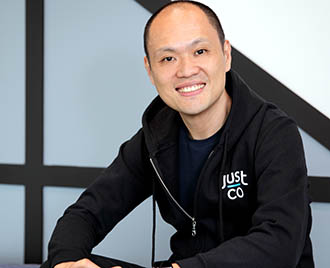➤ JustCo is optimistic that demand for coworking spaces, particularly from large enterprises, will keep rising.
➤ Enterprises are rethinking their real estate strategies after the pandemic.
➤ Large companies seek to balance between work-from-home and office presence.
 |
Kong Wan Sing, founder and CEO of JustCo (Singapore) Pte. Ltd. Source: JustCo (Singapore) Pte. Ltd. |
JustCo (Singapore) Pte. Ltd., a coworking spaces provider backed by Singapore's sovereign wealth fund GIC Pte. Ltd., is seeing "tremendous growth" in the demand for flexible working spaces, with enterprise customers now leading, thanks to a shift in the way people may work following the coronavirus pandemic. Accordingly, companies are rethinking their real estate strategies and shifting to more hybrid work models.
Faster internet has allowed employees to work from anywhere and many executives who have not seen their offices much since March may prefer to not go back even when the pandemic is over. Still, companies need to keep their teams together and large enterprises are facing the limitations of having their employees work remotely.
Companies are now increasingly seeking to balance between allowing employees to work from home while also keeping teams together, Kong Wan Sing, CEO and founder of the largest coworking space operator in the Asia-Pacific region, said in an interview with S&P Global Market Intelligence.
Almost 90% of the new business inquiries for JustCo now come from enterprises, from about half before the pandemic, Kong said.
The following conversation has been edited for length and clarity.
S&P Global Market Intelligence: How did the pandemic affect the coworking space business?
Kong Wan Sing:
How is that an attractive solution for companies?
Large corporates are feeling the limitations of remote working, especially the crucial team-bonding, face-to-face interactions and productivity that are best achieved when teams are together. Companies still need to keep their teams together – by combining both WFH and also office presence.
Real estate cost is easily the top two biggest expenses in any business, alongside payroll. With businesses uncertainties ahead, companies need more office solution options that allow maximum flexibility.
What changes do you expect to see in the industry after the pandemic?
COVID-19 has accelerated demand for coworking, particularly from enterprises. This is something I have seen over the last three months and I foresee the momentum will keep on building when the pandemic is over. As a result of the pandemic, more historically traditional businesses are adopting coworking for their employees.
What do you think is driving the growth in the enterprises' demand for flexible working spaces?
Before COVID, about 50% to 60% of [the total deals were from enterprises]...now it is about 90%. We have witnessed [demand growth] particularly in the last three months when a lot of markets opened up and a lot of [pandemic-related] restrictions were lifted. Enterprises want to allow their staff to work anywhere, to a certain degree. They intend to intensify their offices and probably trim down to 50% of the space they use. They might convert spaces to meeting rooms, a big collaboration area, a pantry area and maybe some offices but beyond that, they will allow staff to work anywhere.
Working from home is actually not feasible for a lot of people because the infrastructure -- the internet might not be stable and you get a lot of disturbances. That's why a lot of enterprises are signing up for these flexible, on-demand office spaces.
Which markets do you plan to focus on and how do you plan to compete?
Singapore remains as the strongest market for JustCo as we continue to open new spaces. JustCo continues to expand across the Asia-Pacific in markets such as Bangkok, Shanghai, Jakarta, Seoul, Sydney, Melbourne, Taipei and Japan.
In October, JustCo launched its Digital Future of Work Platform at The Centrepoint in Singapore, marking its first smart co-working center. Enabled by workspace technologies, the center features facial recognition, card-free access and an in-house fully automated RATIO cafe.
The company also partnered with Switch, the world's first workspace-on-demand platform, and SixSense, a software for spatial analytics and social distance detection.
How did the pandemic affect your portfolio?
We don't disclose very detailed information publicly. Our largest shareholder, GIC, strictly controls a lot of our disclosures. What I can say is that we are the largest Asian co-working space operator in Asia. Our average occupancy, I think, is around 80%. It dropped a little bit, [during] COVID. But in the last three months, we saw tremendous demand, especially from enterprises.



